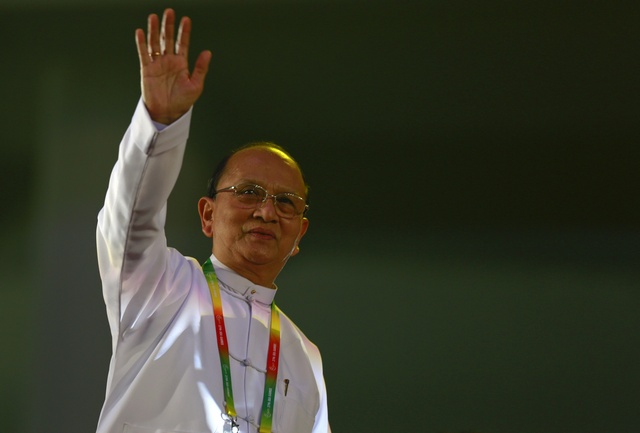Constitutional reform should be initiated once the government has signed a a nationwide ceasefire agreement with all 17 ethnic armed groups currently involved in the peace process, Burma’s President Thein Sein said on Saturday during his monthly radio address.
The National League for Democracy (NLD) has long called for amendments to Article 436 of the 2008 Constitution, which they believe is undemocratic. The clause requires more than 75 percent of parliament to vote for any constitutional amendments. Since the military presently holds 25 percent of parliamentary seats, it automatically has veto power over the Constitution.
Thein Sein said any amendment should wait on a resolution between the government and the 17 ethnic armed groups that are in the midst of drafting a ceasefire agreement, a process that has taken years and has been marred by clashes in various states.
[pullquote]“There are individuals who do not want true democracy in this country and they keep giving excuses.”[/pullquote]
“We must all accept the basic rule that a living, breathing Constitution is always evolving and the changes must be made under the right conditions and at the appropriate time that is compatible with society’s political economic and social needs,” Thein Sein said, according to an English-language translation on the President’s Office website.
Omitted from the published translation, Thein Sein also said all amendments would depend on a resolution between the negotiating parties of the ethnic Nationwide Ceasefire Coordination Team (NCCT) alliance and the government-appointed Union Peace-making Work Committee (UPWC).
“I believe that any amendment should be based upon agreements made in the political dialogue, which will take place between the government and the ethnic parties as part of the peace process,” he said, adding that the amendments must be inclusive of all ethnicities.
“It is necessary that the amendments include basic fundamentals ensuring a political generosity so that no citizen or ethnic nationalities are prevented from assuming political leadership of Burma, while also keeping in mind that national interest and sovereignty should be safeguarded,” Thein Sein said.
NLD leader Aung San Suu Kyi, who was married to a British national and has two children, is effectively barred from running for the presidency by Article 59(f) of the Constitution. To overturn this, the opposition party is travelling nationwide to campaign for constitutional amendments, starting with Article 436.
Addressing supporters from the towns of Pyinmana, Tatgon and Lewe in the capital of Naypyidaw, Suu Kyi said Thein Sein’s remarks indicate that he does not have a genuine desire to see democratic reform in Burma.
“There are individuals who do not want true democracy in this country and they keep giving excuses,” she said to a crowd of supporters her party estimated reached “tens of thousands”.
“One of the excuses he gave is that bringing about internal peace is important and should be prioritized, but that constitutional reforms can be shelved,” Suu Kyi continued. “I would like you all to clearly understand that he said this because he has no wish to change the Constitution. This is something that can be done promptly if there is genuine will.”
Jimmy, spokesman for civil society group 88 Generation Peace and Open Society (88GPOS) – which was borne out of the 1988 student-led uprising against the government – said the president’s suggestion was not practical as the peacemaking process could take years.
The 88GPOS agreed earlier this year that it would cooperate with the NLD on campaigning for constitutional reform.
“The president’s suggestion – to only amend the Constitution after the peace process – is not practical,” Jimmy said. “We should amend what we can at each stage and make necessary amendments down the line based on the ongoing peace process.”
[related]
The peace process will likely take a very long time, said Salai Lian Hmung Sakhong, a member of the NCCT from the Chin National Front. Not only will it include a ceasefire agreement – which has not yet been achieved – the NCCT will also have to facilitate political dialogue and a Union Congress, after which they will be able to start proposing amendments to the existing Constitution, he said.
“We will encourage them [the NLD] to continue their work – we will not tell them to wait for us,” Salai Lian Hmung Sakhong said. “As our country has endured over 60 years of civil war, and so many challenges and political struggles, just finding one solution won’t be sufficient to deal with all of them.
Sai Lek, spokesman for the Shan Nationalities League for Democracy – which is also part of the ethnic bloc’s negotiating team – said political dialogue is key to moving any reform forward.
“Because we lack political dialogue, we weren’t able to start discussions about the constitutional clauses we want to amend,” Sai Lek said. “While I don’t oppose the idea of trying to make charter reforms in the parliament, I also hope that we will have a Constitution based on the political accord that we have been negotiating.
“But at the same time, I believe there should be a specific time frame,” Sai Lek said.
Burma’s next national election is due to take place in November 2015.



